

Modernism: A Very Short Introduction. Postmodernism: A Very Short Introduction. The Avant Garde: A Very Short Introduction (Very Short Introductions) eBook: David Cottington: Amazon.co.uk: Kindle Store. Alison Bechdel. 2006 - Fun Home: A Family Tragicomic. Wiki. Fun Home (subtitled A Family Tragicomic) is a 2006 graphic memoir by American writer Alison Bechdel, author of the comic strip Dykes to Watch Out For.
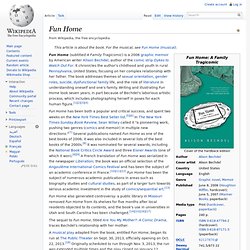
Virginia Woolf. Adeline Virginia Woolf (/ˈwʊlf/; nee Stephen; 25 January 1882 – 28 March 1941) was an English writer, and one of the foremost modernists of the twentieth century.
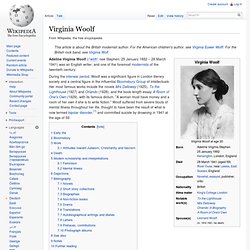
During the interwar period, Woolf was a significant figure in London literary society and a central figure in the influential Bloomsbury Group of intellectuals. Her most famous works include the novels Mrs Dalloway (1925), To the Lighthouse (1927) and Orlando (1928), and the book-length essay A Room of One's Own (1929), with its famous dictum, "A woman must have money and a room of her own if she is to write fiction. " Woolf suffered from severe bouts of mental illness throughout her life, thought to have been the result of what is now termed bipolar disorder,[1] and committed suicide by drowning in 1941 at the age of 59.
Early life[edit] Woolf was educated by her parents in their literate and well-connected household at 22 Hyde Park Gate, Kensington. Bloomsbury[edit] 1927 - To The Lighthouse. Wiki. To the Lighthouse is a 1927 novel by Virginia Woolf.
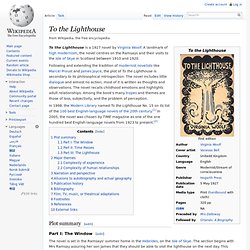
A landmark of high modernism, the novel centres on the Ramsays and their visits to the Isle of Skye in Scotland between 1910 and 1920. In 1998, the Modern Library named To the Lighthouse No. 15 on its list of the 100 best English-language novels of the 20th century.[1] In 2005, the novel was chosen by TIME magazine as one of the one hundred best English-language novels from 1923 to present.[2] Plot summary[edit] Part I: The Window[edit] Charles Baudelaire. Charles Pierre Baudelaire (French: [ʃaʁl bodlɛʁ]; April 9, 1821 – August 31, 1867) was a French poet who also produced notable work as an essayist, art critic, and pioneering translator of Edgar Allan Poe.
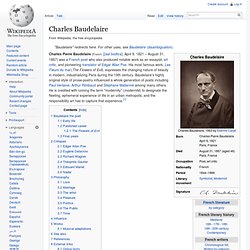
1869 - Paris Spleen. Google Books. Charles Baudelaire, 1821 - 1867 Charles Baudelaire had perhaps had an immeasurable impact on modern poetry.
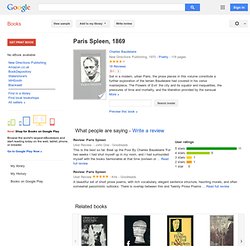
Wiki. Le Spleen de Paris, also known as Paris Spleen or Petits Poèmes en prose, is a collection of 51 short prose poems by Charles Baudelaire.
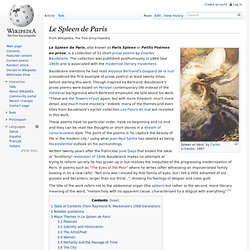
The collection was published posthumously in 1869 (see 1869) and is associated with the modernist literary movement. Baudelaire mentions he had read Aloysius Bertrand's Gaspard de la nuit (considered the first example of prose poetry) at least twenty times before starting this work. Though inspired by Bertrand, Baudelaire's prose poems were based on Parisian contemporary life instead of the medieval background which Bertrand employed.
Gustave Flaubert. Gustave Flaubert (French: [ɡystav flobɛʁ]; December 12, 1821 – May 8, 1880) was an influential French writer widely considered one of the greatest novelists in Western literature.
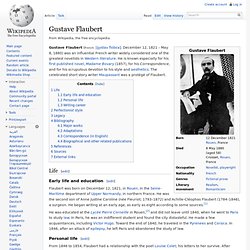
He is known especially for his first published novel, Madame Bovary (1857), for his Correspondence, and for his scrupulous devotion to his style and aesthetics. The celebrated short story writer Maupassant was a protégé of Flaubert. 1856 - Madame Bovary. Google Books. Wiki. Madame Bovary (1856) is the French writer Gustave Flaubert's debut novel.
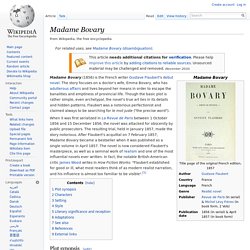
The story focuses on a doctor's wife, Emma Bovary, who has adulterous affairs and lives beyond her means in order to escape the banalities and emptiness of provincial life. Though the basic plot is rather simple, even archetypal, the novel's true art lies in its details and hidden patterns. Flaubert was a notorious perfectionist and claimed always to be searching for le mot juste ("the precise word"). Plot synopsis[edit] Sigmund Freud. Sigmund Freud (/frɔɪd/;[2] German pronunciation: [ˈziːkmʊnt ˈfʁɔʏ̯t]; born Sigismund Schlomo Freud; 6 May 1856 – 23 September 1939) was an Austrian neurologist, now known as the father of psychoanalysis.
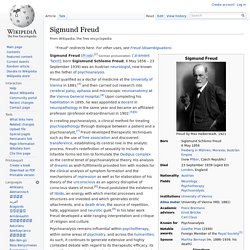
Freud qualified as a doctor of medicine at the University of Vienna in 1881,[3] and then carried out research into cerebral palsy, aphasia and microscopic neuroanatomy at the Vienna General Hospital.[4] Upon completing his habilitation in 1895, he was appointed a docent in neuropathology in the same year and became an affiliated professor (professor extraordinarius) in 1902.[5][6] Psychoanalysis remains influential within psychotherapy, within some areas of psychiatry, and across the humanities. As such, it continues to generate extensive and highly contested debate with regard to its therapeutic efficacy, its scientific status, and whether it advances or is detrimental to the feminist cause.[10] Nonetheless, Freud's work has suffused contemporary Western thought and popular culture.
1930 - Civilization And Its Discontents. Google Books. Sigmund Freud was the founder of psychoanalysis, simultaneously a theory of personality, a therapy, and an intellectual movement.
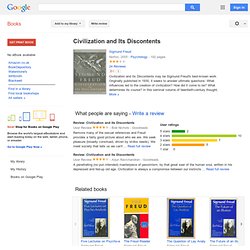
He was born into a middle-class Jewish family in Freiburg, Moravia, now part of Czechoslovakia, but then a city in the Austro-Hungarian Empire. At the age of 4, he moved to Vienna, where he spent nearly his entire life. In 1873 he entered the medical school at the University of Vienna and spent the following eight years pursuing a wide range of studies, including philosophy, in addition to the medical curriculum. After graduating, he worked in several clinics and went to Paris to study under Jean-Martin Charcot, a neurologist who used hypnosis to treat the symptoms of hysteria. When Freud returned to Vienna and set up practice as a clinical neurologist, he found orthodox therapies for nervous disorders ineffective for most of his patients, so he began to use a modified version of the hypnosis he had learned under Charcot.
Wiki. Civilization and Its Discontents is a book by Sigmund Freud. Written in 1929, and first published in German in 1930 as Das Unbehagen in der Kultur ("The Uneasiness in Culture"). It is considered one of Freud's most important and widely read works.[1] Overview[edit] In this seminal book, Sigmund Freud enumerates what he sees as the fundamental tensions between civilization and the individual.
The primary friction, he asserts, stems from the individual's quest for instinctual freedom and civilization's contrary demand for conformity and instinctual repression. Freud's theory is based on the notion that humans have certain characteristic instincts that are immutable.